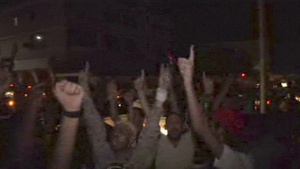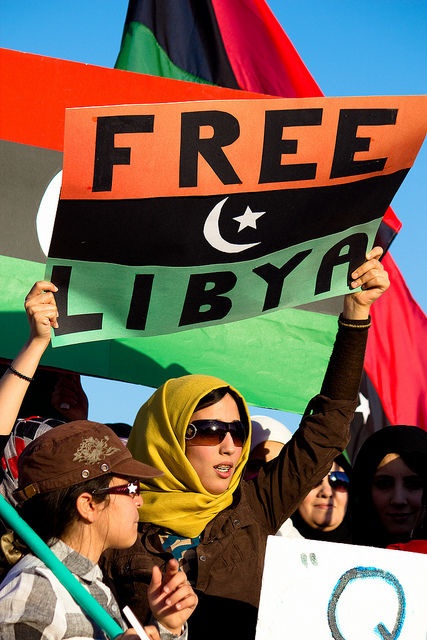

As Gaddafi is about to lose and the Libyan Revolution is about to win, the consequences will ripple beyond in the region and globe. Books will be written, but in 1,000 words or less we’ll try to put up a simple list of those that will win/benefit and those that may lose/suffer – a type of scoreboard. Ironically, the impact initially may be underestimated as consequences regionally and globally, from oil prices to political realignments may take some time to evolve after the revolution’s most visible stage wanes.
Genuine & More Thorough Arab Revolution(s):
The scope and nature of “Arab Change” will be most immediately and directly affected, from Syria to Yemen. It will also perhaps affect the course of change in those countries that have already undergone the first change of their revolutions, particularly Egypt and Tunisia. The momentum will be faster and more change - all Arabs would gain confidence from what was a most difficult but also most complete transformation from the old to the new.
WINNERS:
• NATO (particularly France, United Kingdom and United States who backed a more risky course of action and have seen it pay off). US and NATO allies for once can be projected in a more favorable image among the Arab populace.
• Qatar – as the leader of the anti-Gaddafi opposition within the Arab world as well as the international “Contact Group on Libya.” (After having met mixed success in other areas from Darfur to Yemen in developing its leading role, in Libya Qatar has a concrete success).
• Arab League – It took an unusually decisive stance, despite some subsequent teetering. Under new Arab League Chief Nabil Elaraby, (Read ARTICLE
diplomaticallyincorrect.org/films/blog_post/new-arab-league-head-right-choice-for-the-times-by-ambassador-mo/28411 ) it will more likely be able to employ the moment for greater activism within the Arab community and bring the organization back from the brink of irrelevance.
• International Criminal Court – (It appears Col Gaddafi’s son – Saif has already been arrested and turned over to the ICC). The Court, Prosecutors and Assembly of State Parties took a rather proactive role. The indictment of Gaddafi was seen as “game changer” (Read ARTICLE -
diplomaticallyincorrect.org/films/blog_post/international-criminal-court-game-changer-by-ambassador-mo/25047 ) for ICC and greatest risk was that “deal” would be made with Col. Gaddafi’s in exchange for effective immunity (which could have set dangerous precedent in still the early stages of its development).
• United Nations – The UN and UN Secretary General Ban Ki-moon also took a more potent position on Libya. This includes UN Human Rights institutions -High Commissioner for Human Rights to UN Human Rights Council. The precedent of Libya evidences that UN can be more assertive and forward leaning in promoting change that goes beyond the box – the traditional views of sovereignty and non-interference were trumped by considerations of protecting Libya’s people from its own leader ( even if there was also another set of agendas in confronting Gaddafi by US and NATO allies – precedent is nonetheless established in terms of international law as well as diplomacy). In early part of Libyan crisis at UN, I was frequently interview regarding parallels of UN response to Libya versus Bosnia - and now Libya can perhaps be projected as success while Bosnia is seen as largely ineffective.
• ARAB CHANGE – Perhaps biggest impact will be for more rapid and thorough change in Arab world, (as outlined above). Defeating a despot on the battlefield will give more confidence to “the people” rather than an Arab revolution regressing into a rebellion and overthrow of one set of elites by another. Will this also provide impetus for western and Arab democratic political/open society values and aspirations to be placed in a more complementary alignment, including in evolution of new Arab institutions?
• Oil Prices should drop with one “risk premium” taken out of equation – the fighting in Libya had provided speculators with opportunity to raise petroleum bids by as much as 10-20% by some estimates.
LOSERS:
• Arab despots that still remain, and most immediately Bashar Assad and his Syrian regime.
• African Union members (as South African and Ugandan leaders) that perhaps thought of dealing with Gaddafi as one of their Men’s club members rather than someone who long lost legitimacy.
• Personality Cult leaders in developing world have had piercing of sense of invincibility and image.
• Hugo Chavez fits profile of personality cult politician and very close ally/friend of Gaddafi. He suffers a practical and symbolic loss.
• Some countries as India, Brazil and even Germany (as well as South Africa, Russia & China) overtly promoted a more passive or non-confrontational strategy and objected to military intervention against Gaddafi, but never offered a plausible alternative as was case with Milosevic two decades earlier.
TO BE DECIDED:
• Although China and Russia increasingly objected to nature of NATO’s role in Libya, particularly China was also moving expediently to place its bets on the rebels as well as Gaddafi by opening contacts with Libya's rebel council Transitional National Council.
• Turkey had much to lose economically with collapse of Libya’s establishment. However, Turkey has moved quickly to realign itself with the rebels. Turkey hosted last public gathering of NATO/Qatar lead “Contact Group on Libya and already has momentum to benefit rather than lose from Gaddafi’s collapse.
• Bosnia & Serbia ironically were two countries from former Yugoslavia with extensive economic and other ties with Tripoli. Serbia had provided mercenaries and military trainers to Gaddafi’s forces. On the other hand, despite having voted solidly with NATO and allies for ICC and “air strikes” Bosnian political establishment probably has missed opportunities to realign more rapidly and effectively. Bosnia’s own experience with war and brutality and suffering the consequences of war crimes and other grave violations of international humanitarian law, could have poised it to remind of its own recent history and to play a more proactive role in helping shape the opportunity for Libya.
• Israel loses an enemy but also another domino is toppled to clinging to the status quo. Israel faces further dramatic change. It can be an opportunity or reason just to cling to the status quo. Rhetoric of being the exclusive democracy in the region is no longer a substitute for more proactive Israeli policies. The moment of the triumph of revolution in Libya comes at a particularly contrasting period of Israeli-Egyptian-Palestinian relations as Gaza's chaos becomes a slippery slope.
Libya is a small country but the consequences will be substantial, far ranging and more likely rippling through with more permanent consequences for some time.
Many More Related FILM REPORTS at:
diplomaticallyincorrect.org/c/war-crimes-justice
By Ambassador Muhamed Sacirbey
Facebook Become a Fan at “Diplomatically Incorrect”
Twitter – Follow at DiplomaticallyX



